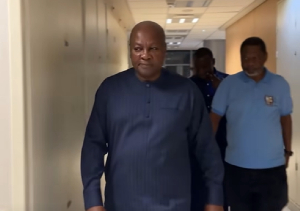The various Ministries, Departments and Agencies (MDAs) as well as Metropolitan, Municipal and District Assemblies (MMDAs) across the country will go paperless as the new National Public Sector Reform Strategy (NPSRS) gets implemented from 2018 to 2023.
According to the Chief Executive Officer of the Public Sector Reform Secretariat, the digitisation of public sector services will be focused on high-level activities aimed at transforming and mainstreaming ICT in business processes of government agencies.
Mr Thomas Kusi Boafo said this will ensure that MDAs and MMDAs ultimately go paperless to reduce drastically the interface that currently exists between citizens and public servants in the provision and receipt of public services.
Mr Boafo noted that the reforms being pursued by the government in the public sector, are to strengthen the local government structures. He believes this will bring governance closer to the people and identify local economic development initiatives to provide opportunities and wealth creation at that level.
The CEO, during a sensitisation forum in Tamale for stakeholders from the Northern, Upper East and Upper West regions on Wednesday, 21 November 2018, disclosed that issues relating to the policy implementation, coordination, monitoring and evaluation and accountability, as well as sustainability, have all been factored into this new policy strategy and, therefore, will not suffer the ill fate that befell previous reforms.
President Nana Addo Dankwa Akufo-Addo in August this year launched the NPSRS on the theme: “Delivering for Citizens and Private Sector”.
Mr Boafo explained that it will, among other things, review and modernise the current structures and skills of personnel. It will also help develop the requisite skills and knowledge needed for the delivery of modern public services.
Meanwhile, Dr Eric Oduro-Osae, a governance analyst explained in an interview with Class News that the policy seeks to improve efficiency in the public sector by removing bottlenecks.
He disclosed that the new strategy is expected to put in place performance management systems to improve supervision to prevent people from creating situations that give room for corruption.
“We have come to realise that local governments are better-placed to reduce corruption, and if we are able to reduce corruption at the local government level, in aggregate terms, corruption will reduce at the regional level and if we add the reduction of corruption at all ten regional levels, it will aggregately reduce corruption at the national level,” he added.
Business News of Friday, 23 November 2018
Source: classfmonline.com













